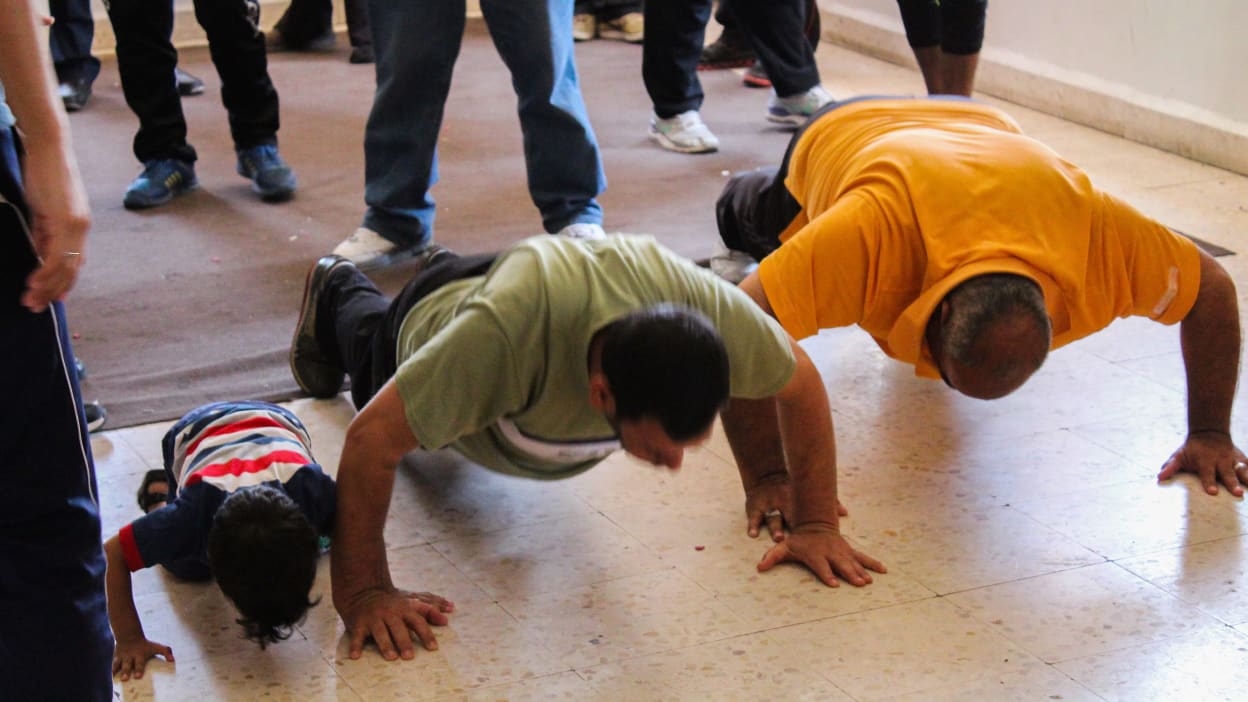When conflict or crises happen, it can be easy to isolate ourselves from others as we try to cope. Masking our true feelings can create tension and – in the worst cases – lead to violence, as we're unable to process our emotions.
But what happens when we let each other in – when friendship becomes part of the solution? In Jordan, through a Tearfund partner's work with Syrian refugees, support groups for men enabled them not just to recover from the horrors of the conflict, but to become peacemakers within their households and communities too. It's a relationship revolution.
No longer safe
The conflict in Syria has raged on for more than 11 years now. Around half of the country's population has fled from the violence. That's 13.5 million people who have left their homes – often with nothing but the clothes on their backs – to find refuge elsewhere.
Zuhair* fled with his wife and children to the border of Syria and Jordan to get away from the fighting – it wasn't safe for them to stay. It was there he was invited to take part in the Keystone programme, a men's support group led by Tearfund's local partners.
The continued conflict had left its mark on Zuhair. 'I used to just stay home,' he says. 'I didn't go out or see anyone else because life was hard. I reached a point when I felt suicidal.'
Lessons in feelings
Through the support group, things began to change. Group sessions with other Syrian refugees gave Zuhair training in budgeting, which helped him to buy essential items as well as save money to help him lift his family out of poverty. There were also sport and exercise classes, which had a transforming effect.
'The lessons that the coach gave us were excellent: about our feelings, raising children and marriage,' says Zuhair. 'The meetings helped to ease the mental pressure that we were experiencing.
'After the Keystone programme, I sat with my children and my wife to discuss with them about our lives and our finances. We had a good, friendly conversation. There were no problems or arguments like before. Even now, we enjoy sports every day as a family.'
And it's not just his immediate family who are benefitting from the change.
'My nephews were surprised,' says Zuhair. 'They asked me: "Uncle, you were always nervous but now you are different. What happened?" I started sitting with my brothers, their wives and children to explain to them that there should be dialogue and tolerance between family members. I also taught them exercises. They thanked me for what I shared with them from the Keystone programme.'
Banishing a harsh past
Basel* is another refugee who enrolled on the programme. He never expected it would lead to his whole neighbourhood getting involved.
'The Keystone programme changed all of us from the inside,' says Basel. 'I believe that all Syrians [in Jordan] have psychological problems.
'Talking about them releases the negative charge inside of you. Through the sessions I learnt to be patient. As a result of the sessions, I learnt how to deal with my children better. I was harsh to them in the past, but not any more. My wife tells me I have changed a lot.
'The other thing that really helped me was the sports,' says Basel.
'We've started playing sports here at home with our children and with my grandchildren. Pretty soon, the neighbours started joining in and we all had fun. We also started sharing exercises with our friends.'
Old men dreaming dreams
The programme encouraged all men in the group to share and help each other, whatever their age or beliefs.
'I may be old, but I still have a lot to learn,' says Basel. 'One young man came to the session. He's just 18 years old but speaks more wisely than someone aged 60 or 70. I have the greatest respect for older people, but sometimes a young man's perspective is more helpful.
'In Keystone, people listen to you. When you share your concerns, people offer a solution. One group member will have one suggestion, someone else will offer another. If you take people's ideas, you can find a suitable path between these different ideas. You can find a practical solution.'
A change of heart
Around the world, Tearfund is working to help end extreme poverty. And, at the root of this, is helping to heal broken relationships. With God, with ourselves, with each other and with creation.
If we want to help people overcome poverty, we need to address these – anything less is just a sticking-plaster solution. This is why you'll find our programmes are focused not just on providing practical support, but offering a more holistic approach. This leads to long-term transformation for those taking part, who in turn become change-makers themselves – changing families, neighbours and whole communities for good. As Zuhair learnt through the sessions: 'Your heart can be welcoming to all people.’








